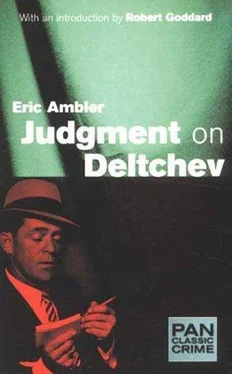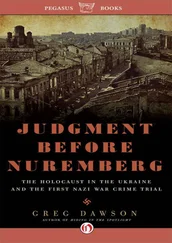Eric Ambler - Judgment on Deltchev
Здесь есть возможность читать онлайн «Eric Ambler - Judgment on Deltchev» весь текст электронной книги совершенно бесплатно (целиком полную версию без сокращений). В некоторых случаях можно слушать аудио, скачать через торрент в формате fb2 и присутствует краткое содержание. Год выпуска: 1977, ISBN: 1977, Издательство: Vintage, Жанр: Криминальный детектив, на английском языке. Описание произведения, (предисловие) а так же отзывы посетителей доступны на портале библиотеки ЛибКат.
- Название:Judgment on Deltchev
- Автор:
- Издательство:Vintage
- Жанр:
- Год:1977
- ISBN:9780307049971
- Рейтинг книги:4 / 5. Голосов: 1
-
Избранное:Добавить в избранное
- Отзывы:
-
Ваша оценка:
- 80
- 1
- 2
- 3
- 4
- 5
Judgment on Deltchev: краткое содержание, описание и аннотация
Предлагаем к чтению аннотацию, описание, краткое содержание или предисловие (зависит от того, что написал сам автор книги «Judgment on Deltchev»). Если вы не нашли необходимую информацию о книге — напишите в комментариях, мы постараемся отыскать её.
Judgment on Deltchev — читать онлайн бесплатно полную книгу (весь текст) целиком
Ниже представлен текст книги, разбитый по страницам. Система сохранения места последней прочитанной страницы, позволяет с удобством читать онлайн бесплатно книгу «Judgment on Deltchev», без необходимости каждый раз заново искать на чём Вы остановились. Поставьте закладку, и сможете в любой момент перейти на страницу, на которой закончили чтение.
Интервал:
Закладка:
He paused again and there was dead silence. We knew that now he was talking about Deltchev. He clasped his hands in front of him.
‘Let me give you an example from history, gentlemen,’ he said; ‘not the history of our own country, but that of Italy and France. In 1830 there was in Italy a young exile named Louis Bonaparte, a nephew of the first Napoleon and once his adopted grandson. In Italy also at that time there was a secret terrorist society called the Carbonari — the Charcoal Burners. Among the members were nobles, officers, landlords, government officials, peasants, and priests. The members called each other “cousin” and the only form of resignation ever accepted from a member was his death. This young Bonaparte became a member of the Carbonari and a year after was imprisoned by the Austrian police for his part in a murderous affair. He was not then a very important or responsible person. But twenty-eight years later, when that same man was Napoleon III, Emperor of France, the Carbonari had need of him and sent a reminder by an assassin named Orsini. The reminder was a gift of three bombs, and they exploded one evening in the January of 1858 as the emperor was arriving at the Opéra in Paris. Eight innocent bystanders were killed and a hundred and fifty wounded, but Cousin Bonaparte was quite safe. What the Carbonari wanted from him was help to make a bourgeois revolution in Italy. He did not hesitate. The responsibilities of Napoleon III, Emperor of France, toward the people he ruled were as nothing beside those of Cousin Bonaparte toward the Carbonari terrorists. And so the Italian Risorgimento was paid for with the blood of the French soldiers that soaked the fields of Montebello and Turbigo and Solferino. It is not a pretty story — no prettier than that of Shatev and his family.’
There was silence for a moment.
He added quietly, ‘Gentlemen, our people will fertilize no more fields for the “cousins” or “brethren” of this century. We intend to seek out all the murderers whether they sit on café chairs or on the thrones they have made for themselves above the heads of the people. The People’s Party and its great leader Vukashin are pledged to that.’ He looked round at us again and then sat down. ‘I will answer questions,’ he said.
It was quite well done and for a space nobody moved; then an American in front of me got up.
‘In December of last year, Minister,’ he said, ‘the People’s Party Government announced that the Officer Corps Brotherhood had been completely — eliminated . I think that was the word used. Are we to understand now that that announcement was incorrect?’
Brankovitch nodded. ‘Unfortunately, yes. At the time, of course, we believed it to be true. Later developments have shown that we were mistaken.’
‘What later developments, Minister?’
‘I would prefer not to anticipate the court proceedings.’
A small dark man got up.
‘Minister, was not Deltchev himself responsible for the very vigorous proceedings taken to eliminate the Brotherhood?’
‘He was certainly responsible for the action against the Brotherhood that we now know to have been ineffective, but the decision that there should be action was taken by the Provisional Government as a whole. In other words, the People’s Party participated in the decision but not in the carrying out of it.’
Others began to rise and now the questions came quickly.
‘Minister, can your allusion to Napoleon III be taken to mean that the government links the allegations about Deltchev’s peace negotiations with the allegations about his membership in the Brotherhood?’
‘You may draw that conclusion if you wish.’
‘The charge is that Deltchev was to be paid for his efforts. Aren’t the two suggestions inconsistent?’
‘Possibly. But remember that Napoleon III also had his reward — Nice, the Riviera, Savoy.’
‘Minister, do you consider that the evidence heard so far in court has gone any way toward proving any of the charges against Monsieur Deltchev?’
‘The evidence must be considered as a whole.’
‘By whom was defending counsel appointed, Minister?’
‘By the government. In all cases when a prisoner fails to appoint counsel to defend him that is done.’
‘Did this prisoner fail to appoint counsel? Did he not, as an advocate, wish to defend himself?’
‘On a criminal charge a prisoner is not by law permitted to conduct his own defence. The law was made for the benefit of poor persons certain of conviction who feared to burden their families with legal costs.’
‘Minister, could not the law, clearly not intended for persons in Monsieur Deltchev’s position, be waived in this case?’
‘Are laws waived in England for the benefit of persons in high position?’
‘Then you agree, Minister, that it would be to Monsieur Deltchev’s benefit if he could defend himself?’
‘It would be to the benefit of you gentlemen, I have no doubt. I apologize for our reluctance to have the court turned into a circus entertainment.’
‘Will the Minister say if, as a result of the Prosecutor’s unhappy efforts yesterday to provide the court with entertainment, the prisoner will now be allowed proper medical attention in the prison?’
Brankovitch rose to his feet with a smile. ‘The prisoner is receiving ample medical attention,’ he said, ‘and as much insulin as he wishes. It was nothing more sinister than a stupid administrative blunder that prevented his having attention a few days ago. Disciplinary action has been taken against those responsible. Naturally the prisoner took the utmost advantage of his plight to gain sympathy …’
‘When driven to do so by the Prosecutor?’
‘Or when a favourable opportunity presented itself.’ Brankovitch smiled again. ‘We interpret motives from the standpoint of our own prejudices. But please note that the prisoner was not prevented from addressing you.’
‘What he said was not reported in the official press, Minister.’
‘Quite properly. The fact that a man is diabetic surely does not affect his responsibility to the community for criminal acts. Gentlemen, perhaps you would care to continue our discussion over the refreshments. I hope you will not think I am attempting to corrupt you if I say that there is champagne and caviar for you to sample. I am merely performing another of my functions as a Minister in introducing to you two products of our agricultural and fishing industries which we are anxious to export. The champagne is not French, of course, but it is a dry, sparkling wine of pleasing character and I think you will like it.’
There were one or two murmurs of amused assent and a scraping of chairs. Waiters entered, obviously in response to a signal, and whisked away the napkins from the buffet.
‘He is clever, the Minister,’ said Pashik seriously.
‘Yes, he is. Shall we go?’
He looked shocked. ‘Do you not wish to ask questions, Mr Foster?’
‘What about? Napoleon the Third?’
‘I think it would be impolite to go,’ said Pashik earnestly. ‘The Minister will surely wish to meet you. There is protocol to be observed.’
‘There are others going.’ Though most of those present had moved over to the buffet and stood in groups talking, I noticed several making unobtrusive exits.
‘Those are local agency men, Mr Foster. They have met the Minister before.’
‘All right. Shall we go over?’ Brankovitch was talking to a group that included Sibley, the man who drank too much and was indiscreet.
‘No, Mr Foster. Let us quietly have some refreshments. Presently matters will arrange themselves.’
We were joined after a moment or two by an American I had chatted with once or twice at the courthouse. A waiter brought us wine and caviar sandwiches. One of the secretaries delivered copies of a long blood-curdling piece on the Officer Corps Brotherhood.
Читать дальшеИнтервал:
Закладка:
Похожие книги на «Judgment on Deltchev»
Представляем Вашему вниманию похожие книги на «Judgment on Deltchev» списком для выбора. Мы отобрали схожую по названию и смыслу литературу в надежде предоставить читателям больше вариантов отыскать новые, интересные, ещё непрочитанные произведения.
Обсуждение, отзывы о книге «Judgment on Deltchev» и просто собственные мнения читателей. Оставьте ваши комментарии, напишите, что Вы думаете о произведении, его смысле или главных героях. Укажите что конкретно понравилось, а что нет, и почему Вы так считаете.












